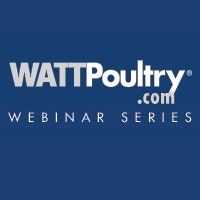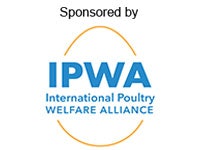

This webinar will broadcast at 8:00 AM CST (Chicago) / 2:00 PM GMT (London) / 10:00 PM CST (Beijing)
WHAT YOU'LL LEARN:
- The importance of biosecurity in improving poultry health, productivity, and operational sustainability.
- How to utilize biosecurity auditing tools to evaluate current practices and identify actionable areas for improvement.
- An overview of various disinfectant products, their effectiveness, and application techniques in poultry facilities.
- Practical steps to implement enhanced biosecurity measures for improved flock livability and reduced disease risk.
This webinar is sponsored by IPWA and presented by WATTPoultry.
Speaker Information:

Dr. Morgan Farnell was raised on beef cattle ranches in Redwater, TX and Hope, AR. He obtained a B.S. in Agricultural Business from Southern Arkansas University and worked for Tyson Foods (Broken Bow, OK) as a processing plant supervisor directing 150 employees. He acquired a M.S. in Poultry Science concentrating on pre-harvest food safety and a Ph.D. in Veterinary Microbiology focusing on avian immunology at Texas A&M University (TAMU). Dr. Farnell completed postdoctoral fellowships with the Institute for Animal Health in the United Kingdom and the USDA Agricultural Research Service at the University of Arkansas where he studied chicken dendritic cells and Campylobacter pre-harvest intervention strategies, respectively. He was a Poultry Extension Specialist with TAMU and Mississippi State University (MSU) for 11 years focusing on biosecurity, cleaning and disinfection, dust amelioration, euthanasia, mass depopulation, and reportable disease/disaster response. He returned to the TAMU Poultry Science Department in 2016, where he serves as a professor and associate department head for extension with research (45%), teaching (35%), extension administrative (15%), and service (5%) split. He has recently focused on antimicrobial resistance and antibiotic alternatives to improve food safety and gut health. He currently teaches Immunology (graduate), Advanced Food Bacteriology (undergraduate), and International Poultry Production - Mexico (undergraduate).

Dr. Jeroen Dewulf is a highly accomplished veterinarian and researcher specializing in veterinary epidemiology. He graduated as a veterinarian from the Faculty of Veterinary Medicine at Ghent University, Belgium, in 1998. In 2002, he completed his Ph.D. on the epidemiology and control of classical swine fever and also earned a Master of Science degree in Veterinary Epidemiology from the University of Utrecht, the Netherlands, graduating Cum Laude. He became a diplomat in the European College of Veterinary Public Health in 2005 where he later on served as a board member and president (2015-2017). Currently, Jeroen Dewulf serves as a full professor in Veterinary Epidemiology at the Faculty of Veterinary Medicine of Ghent University. His primary research interests include antimicrobial use and resistance in animals, as well as the prevention of epidemic and endemic diseases with an emphasis on biosecurity. He is passionate about turning data in to veterinary expertise and policy for the benefit of animal and human health. He has been appointed as the head of the Department of Internal Medicine, Reproduction, and Population Medicine since 2021 and became a member of the board of directors of Ghent University in 2022. Jeroen Dewulf leads the Veterinary Epidemiology Unit and supervises over 10 Ph.D. students conducting research in veterinary epidemiology. He is a prolific author with (co-)authorship of over 400 A1 publications in the field and an H-index of > 70. Recently, he co-founded the spin-off company Biocheck. Gent and coordinates the EU research consortium BIOSECURE, which focuses on cutting-edge research in biosecurity in terrestrial animal production. In addition to his academic and research roles, Jeroen Dewulf has been an active member of several committees and boards. Since 2009, he has been a member of the scientific committee of the Belgian Federal Food Agency. He founded the Center of Expertise on Antimicrobial Use and Resistance in Animals (AMCRA) in Belgium and chaired it until 2023. He has also been a member of the board of the Veterinary Medicines Institute (SDa) in the Netherlands since 2020. Currently he is also chairing the ad-how working group of the World Organization on Animal Health (WOAH) who is drafting the new chapter on biosecurity for the terrestrial animal health code. Jeroen Dewulf is the author of the books “Biosecurity in Animal Production and Veterinary Medicine” and “8 Myths on Antimicrobial Resistance Disproved: Practical Guide for Reducing Antibiotic Use in Animal Husbandry”. He is also a frequently sought-after speaker worldwide, delivering talks on biosecurity and animal health.